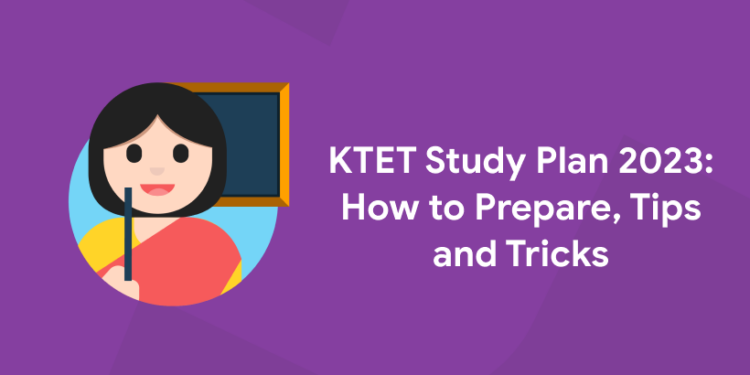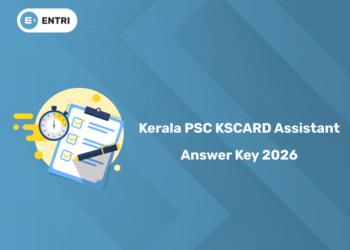Table of Contents
Kerala Pareeksha Bhavan conducts the KTET exam twice every year to make candidates gain eligibility to teach in lower primary, upper primary as well as in high school classes in Kerala. Candidates who qualify for the Kerala Teacher Eligibility Test (KTET) become eligible to apply for teach recruitment in the state. Candidates who are planning to appear for the KTET 2023 exam can begin with their preparations now. To start with the preparation, candidates should first chart out a proper strategy and then go on to implement it to ace the KTET exam. The given below is a detailed KTET Study Plan for the candidates to make the exam preparation more strategic and result-oriented.
Sign up for Entri to get KTET study materials and PDF notes!
KTET Recruitment 2023: Overview
Check out the details of KTET exam notification 2023 here.
| KTET Exam: Overview | |
| Exam Name | Kerala Teacher Eligibility Test or KTET |
| Level | State Level Examination |
| Exam Conducting Body | Kerala Government Education Board |
| Examination Mode | Offline |
| Exam Duration | 150 Minutes |
| Validity | 7 Years |
| Total Marks | 150 Marks |
KTET 2023 Exam Date
1: The first recipient of the ‘Rajiv Gandhi Khel Ratna’ award?
On December 29 and 30, 2023, the Kerala Teacher Eligibility Test (KTET) for the year 2024 will be held. The exam is held to select qualified candidates for teaching positions in Kerala public schools. The KTET exam is divided into four categories: Category I, Category II, Category III, and Category IV, and candidates can apply for any of them based on their qualifications. The application process typically begins on November 6, 2023, with admit cards available for download on December 20, 2023. Candidates must bring their admit cards to the examination center or they will not be allowed to take the exam. For more information, visit the website on a regular basis. Continue reading to get access to the study plan!
Enroll in Kerala's Top-rated HSA Coaching Program!
സർക്കാർ ജോലി എന്ന സ്വപ്നം ഇനി സ്വപ്നം മാത്രമല്ല! Join Entri's HSA Coaching Program
Join Now!KTET Study Plan 2023
We shall divide the 2-months’ time into 7 weeks and shall provide a weekly study planner for your full-proof preparation of examinations. Please note that we are not mentioning any fixed number of hours but our planner is based on topics from various subjects since the objective is to finish the syllabus and not invest your time only.
Week 1 Study Plan
| Day | English Language | Quantitative Aptitude | Reasoning Ability | General Awareness |
| 1 | Reading Comprehension (Understanding the basic technique of solving questions) | Profit and Loss | Coding-Decoding (Letters and Numbers) |
History – Ancient India
|
| 2 | Reading Comprehension (Practice topics from banking and economy) | Simple Interest | Coding-Decoding (language-based and comprehension-based) | |
| 3 | Reading Comprehension (Practice Topics from Social, Technology, and Science, etc.) | Compound Interest | Blood Relations |
History – Mediaeval India
|
| 4 | Reading Comprehension (Misc. Topics) | Ratio and Proportion | Syllogism (normal) | |
| 5 | Fill in the Blanks (Single and Double Fillers) | Mixture and Alligations | Syllogism (negative and positive possibilities) |
History – Modern India (Indian Freedom Struggle)
|
| 6 | Cloze Test (Practice Session) | Simplification (Practice Session) | Syllogism (Misc.) | |
| 7 | Weekly Revision & Take Online Mock Test or Practice with Previous Year Papers | |||
Week 2 Study Plan
| Day | English Language | Quantitative Aptitude | Reasoning Ability | General Awareness |
| 1 | Basic Rules of Grammar (Tenses, Articles, Parts of Speech etc.) | Number System | Seating Arrangement (Linear) | Indian Polity – Preamble, Fundamental Rights and Duties, DPSP etc. |
| 2 | Grammar (Subject-Verb Agreement, degrees of comparison, participles and gerunds, infinitive etc.) | Linear Algebra and various formulae | Seating Arrangement (Circular) |
Indian Polity – State and Central Legislature, President and Vice-President, Prime Minister and Cabinet, Chief Minister and Governor etc.
|
| 3 | Basics of Error Spotting (Application of grammar rules and syntax rules) | Quadratic Equations, Polynomial Functions etc. | Seating Arrangement (Mixed) | Indian Polity – Judiciary, Emergency Provisions, Centre-State Relations, Important amendments etc. |
| 4 | Error Spotting (Advanced level) | Algebra (Misc. rules) | Puzzles (With one variable) | Physics- S.I. unit of quantities, Light and Sound as waves with properties, Gravitational Force |
| 5 | One Word Substitution | Mensuration (2-D figures) | Puzzles (With more than one variable) | Physics- Heat and Thermodynamics, optics (lenses –convex and concave lens etc.), escape velocity |
| 6 | Homonyms | Mensuration (3-D figures) | Puzzles (Advanced level with comprehension related problems) | Physics – Energy and Newton’s Laws of Motion, Relativity Theory, Liquid, solid and gas laws etc. |
| 7 | Weekly Revision with Previous Papers or Mock Tests | |||
Download Entri App! Start your KTET exam preparations now!
Week 3 Study Plan
| Day | English Language | Quantitative Aptitude | Reasoning Ability | General Awareness |
| 1 | Synonyms | Data Interpretation (Line Chart, Bar Graph, Histogram etc.) | Clock Related problems | Chemistry – Atoms and Molecules, chemical bonding, periodic table, carbon and its compounds |
| 2 | Antonyms | Data Interpretation (Pie Chart, rectangular graphs etc.) | Ranking and Direction Test | Chemistry – Solution and Chemical Reactions, Organic Substances and Their usages, valency |
| 3 | Idioms with their meanings | Data Interpretation (Mixed problems) | Number and Letter Series | Chemistry – Nuclear Fission and Fusion, galvanization, metallurgy and misc. topics based on previous year papers |
| 4 | Appropriate Prepositions with verbs | Data Sufficiency | Analogy (Both number and letter based) | Biology – Human Anatomy (Various parts of human body with functions) |
| 5 | Para Jumbling (Understanding the flow of a paragraph) | Time and Distance (Train and Platform related problems+ Boat and Stream related problems) | Matrix | Biology – Plant Physiology (Cell structure etc.) |
| 6 | Para Jumbling (Practice Session) | Time and Distance (Misc.) | Dictionary Rankings and Word Related Problems (Jumbled Words, word formation etc.) | Biology – Vitamins and diseases, virus and bacteria related diseases, immune system in plants and humans etc. |
| 7 | Weekly Revision with Previous Papers or Mock Tests | |||
Week 4 Study Plan
| Day | English Language | Quantitative Aptitude | Reasoning Ability | General Awareness |
| 1 | Confusing Words – At a Glance with spellings and applications | Time and Work (Men and Days based) | Non-Verbal Reasoning (paper cutting and folding, analogical figures etc.) | Economics – terms such as GDP, GNP, NDP, NNP, GST, Direct and Indirect Taxes, National Income, Per Capita Income, Inflation, IIP etc. |
| 2 | Sentence Improvement (Based on basic rules of grammar) | Time and Work (Pipe and Cistern based) | Non-Verbal Reasoning (Mirror Image, Hidden Images etc.) | Indian Economy – Nature and Characteristics, Regulatory bodies such as RBI, SEBI, PFRDA and their functions, money market and securities market, unemployment etc. |
| 3 | Misfit Sentences (Understanding the logic and Practice Session) | Geometry (Triangle Properties) | Non-Verbal Reasoning (Misc. based on previous year papers) | Indian Economy – Planning, NITI Ayog, Poverty Alleviation, Five Year Planning etc. |
| 4 | Sentence Completion (Practice Session) | Geometry (Properties related to squares, rectangles, rhombuses, parallelograms, trapeziums etc.) | Analytical Reasoning (Statement and Conclusion problems) | Geography – Solar System, Deserts, Volcanoes, Rivers, Glaciers, Atmospheric layers, ocean currents etc. |
| 5 | Phrase Replacement (Practice Session) | Geometry (Properties related to circles, tangents etc.) | Analytical Reasoning (Statement and Argument Problems) | Indian Geography – Physical Properties, Climate, Natural Vegetation, Soils and Crops, irrigation system |
| 6 | Miscellaneous Topics based on Previous Year Papers | Geometry (Misc. such as angles, sides etc.) | Analytical Reasoning (Misc.) | Indian Geography – famous in India and its states, world-famous sites etc. |
| 7 | Weekly Revision with Previous Papers or Mock Tests | |||
Week 5 Study Plan
| Day | English Language | Quantitative Aptitude | Reasoning Ability | General Awareness |
| 1 |
Revision of chapters from the first and second week
|
Trigonometry (Ratio of angles, formulae etc.) |
Revision of chapters from 1st and 2nd week
|
Current Affairs (last month)
|
| 2 | Trigonometry – Height and Distance | |||
| 3 | Approximation problems |
Current Affairs (Second last month)
|
||
| 4 |
Revision of first-week chapters
|
|||
| 5 |
Current Affairs (third last month)
|
|||
| 6 | ||||
| 7 | Revision of CA of 3 months- at a glance |
Week 6 Study Plan
| Day | English Language | Quantitative Aptitude | Reasoning Ability | General Awareness |
| 1 |
Revision of chapters from 3rd and 4th week
|
Revision of chapters from 2nd and 3rd week
|
Revision of chapters from 3rd and 4th week
|
Current Affairs (4th last month)
|
| 2 | ||||
| 3 |
Current Affairs (5th Month)
|
|||
| 4 | ||||
| 5 |
Current Affairs (6th month)
|
|||
| 6 | ||||
| 7 | Weekly Revision – CA of 3 months at a glance |
Week 7 Study Plan
| Day | English Language | Quantitative Aptitude | Reasoning Ability | General Awareness |
| 1 |
Solving of questions from any standard grammar / RC book (chapters of 1st and 2nd week only)
|
Revision of 4th week chapters
|
Question-solving (1st and 2nd week chapters)
|
Computer – history and generations, memory, software and hardware, input and output devices |
| 2 | Computer – Abbreviations, terminology, shortcuts in keyboards | |||
| 3 | Computer – MS Office, DBMS, Networking, internet, e-mail, programming basics | |||
| 4 |
Solving of Questions (1st and 2nd week chapters)
|
Banking and Finance Awareness (includes the history of banking, types of banks, banking terms, fund transfer such as RTGS, NEFT etc. small finance and payment banks, RBI, etc.)
|
||
This was a detailed 7-week study planner to assure your success in competitive exams. This study planner is meant to help you in cracking any competitive exam in 2 months without the help of any coaching institute. The main thing is to lay your hands on complete study materials before the preparation along with access to quality mock tests to test your knowledge after you are done with the syllabus.
Click here to download KTET study plan pdf!
KTET Syallabus 2023
The detailed syllabus and exam pattern for the Kerala Teacher Eligibility Test (KTET) 2023 are now available for download. If you qualify, you can access and download the syllabus to begin studying for the exam. It is critical to thoroughly review the syllabus in order to understand the topics and concepts covered in the exam. Find the below link to download KTET Syllabus 2023 PDF.
| KTET SYLLABUS 2023 | |
| KTET SYLLABUS FOR CATEGORY 1 | |
| KTET SYLLABUS FOR CATEGORY 2 | |
| KTET SYLLABUS FOR CATEGORY 3 | |
| KTET SYLLABUS FOR CATEGORY 4 |
Kerala TET Exam Pattern 2023
Every year, the KTET examination follows a specific examination pattern, which candidates must understand before taking the exam. The details of the KTET Exam pattern 2023 are provided below.
Exam duration: 2 hours and 30 minutes
Maximum Points were met: 150
The total number of questions is 150.
Click on the provided link below to download Kerala TET Exam Pattern 2023
| KTET EXAM PATTERN 2023 | |
| KTET EXAM PATTERN FOR CATEGORY 1 | |
| KTET EXAM PATTERN FOR CATEGORY 2 | |
| KTET EXAM PATTERN FOR CATEGORY 3 | |
| KTET EXAM PATTERN FOR CATEGORY 4 |
Grab Latest study materials for KTET Exam! Register Here!!
Enroll in Kerala's Top-rated HSA Coaching Program!
സർക്കാർ ജോലി എന്ന സ്വപ്നം ഇനി സ്വപ്നം മാത്രമല്ല! Join Entri's HSA Coaching Program
Join Now!KTET Mock Tests 2023
Candidates who are preparing for the KTET examination need to make their exam preparation strategic and result-oriented. For this candidates need to get familiarised with the examination, exam pattern, kind of questions asked, and the difficulty level of the examination. Mock tests can be used as a medium for this. Entri App provides mock tests covering various topics that will enable the candidates to get an idea regarding the question paper and the portions that they have to prioritize as they prepare for the examination. The given below are some of the mock tests that candidates can make use of as part of KTET exam preparation 2023.
| Topic | Link |
| Environmental Science | |
| Mathematics | |
| Child Development and Pedagogy | |
| Physical Science | |
| Chemistry | |
| Social Science |
KTET Previous Question Papers PDF
The given below is some of the KTET Previous Year Question papers that the candidates can use for their KTET Exam preparation 2023.
| KTET Previous Year Questions Papers | |
| K-TET-Caregory-II-Paper-II-2012 | |
| K-TET-Cartegory-IV-For-Language-Teachers | |
| KTET-KTET-August-2012-Set-A | |
| KTET-KTET-August-2012-Set-A-Part-III-English | |
| K-TET-Caregory-I-Paper-I-2012-For-class-I-to-V | |
KTET 2023 Exam Preparation Tips
The given below are some of the preparation tips that the candidates can follow for their KTET exam preparation 2023.
- Get to Know the detailed syllabus and exam pattern: The first and foremost preparation tip is to get to know the complete syllabus and exam pattern. Candidates should be aware of the exam pattern and syllabus before beginning their exam preparation.
- Schedule a proper timetable: Planning a proper timetable can arrange priorities and, it helps your exam preparation effectively. Making time table is the key to acing the exam simply and effectively. Aspirants must devote their time to learning the topics perfectly. Candidates must have a well-planned timetable. Applicants try to stick to their study plan properly.
- Find out easy and difficult Topics: Candidates have to make a list of easy and complicated topics after they have to move through the detailed syllabus.
- Practice the topics: Practice the exam topics is the key to ace your goal. It will help you to know the topics thoroughly. Regular Practice will aid the candidates to acquire speed with efficiency.
- Revision of the Topics: The revision will help the candidates to re-learn the topics, especially the most challenging subjects. It will improve the candidate’s memory power.
- Time Management: Time management is another crucial element for all insurance exams. So, practice as much as possible. This would enhance the speed of attempting questions in the exam paper. It helps you to score high marks.
- Remain Updated Yourself: The aspirants should keep themselves engaged with the magazines related to the insurance industry. Candidates must improve their General Awareness. They have to update themselves with day-to-day insurance topics.
- Mock Tests – are the best way to analyze your preparation level. It assists in time management as well as in handling exam pressure during the actual exam. Mock tests improve your accuracy and help you maintain speed. By taking mock tests you can easily assess which sections you need to revise better and improve your chance of obtaining higher grades. Aspirants can do the SWOT(Strength Weakness Opportunity Threat) analysis when they finish taking the mock and can work upon bettering themselves.
- Practice Makes a Man Perfect – As the old proverb says, ‘Practice makes a man perfect, it is best to practice as much as you can. To score good results in the actual exam, daily practice is required. Practice concepts of each and every section. You can take two sections to practice in a day like Reasoning and English on a day, while Quantitative Aptitude on the next day followed by a mock test which you can be taken on a daily basis.
- Identify Your Weaker Sections and Work on That: Since most of the topics are based on a basic, high school syllabus that has been studied earlier, you can identify the topics you are strong and weak respectively as you go through the syllabus. Identify your weaker spots and start focusing on them more so that good marks can be scored.
- Be Clear With The Concepts: Brush up on the fundamentals of every subject. This is very important for the topics which have mathematical as well as scientific formulas.
- Memorize The Formulas & Scientific Concepts: For the Arithmetic section, you need to remember a lot of formulas. Practice and memorize them by heart every time you have understood the concepts. The formulas can be made through in your mind with proper practice and strategic preparation. Also, the scientific concepts must be thorough with all candidates who wish to score a good rank as this is recruitment for technical posts.
However, please keep in mind that the study planner should be based on your level of comfort and there is no hard and fast rule of making any such planner other than that one. Prepare your routine, follow it properly, and give your best in the examination. Success will definitely beckon you.













